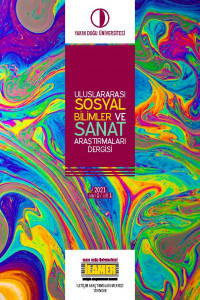“BAŞLANGIÇ OLSUN DİYE”: ARENDT VE DOĞUMLULUK
Hannah Arendt, Natality, Totalitarianism, Action, Freedom
That there be a beginning”: Arendt and Natality
Hannah Arendt, Natality, Totalitarianism, Action, Freedom,
___
- Arendt, H. (1971, October 21). Martin Heidegger at Eighty (A. Hofstadter, Trans.). The New York Review of Books. https://www.nybooks.com/articles/1971/10/21/martin-heidegger-at-eighty/
- Arendt, H. (1973). The Origins of Totalitarianism (New edition). Harvest Book.
- Arendt, H. (1977). Between Past and Future: Eight Exercises in Political Thought. Penguin Books.
- Arendt, H. (1998). The Human Condition (Second Edition). University of Chicago Press.
- Arendt, H. (2005a). On the Nature of Totalitarianism: An Essay in Understanding. In J. Kohn (Ed.) Essays in Understanding, 1930-1954: Formation, Exile, and Totalitarianism (pp. 328–360). Schocken Books.
- Arendt, H. (2005b). “What Remains? Language Remains”: A conversation with Günter Gaus. In J. Kohn (Ed.), Essays in Understanding, 1930-1954: Formation, Exile, and Totalitarianism (pp. 1–23). Schocken Books.
- Benhabib, S. (2003). The Reluctant Modernism of Hannah Arendt (Revised edition). Rowman & Littlefield Publishers.
- Benjamin, W. (2007). Theses on the Philosophy of History. In H. Zohn (Trans.), Illuminations. Essays and Reflections (pp. 253–264). Schocken Books.
- Birmingham, P. (2006). Hannah Arendt and Human Rights: The Predicament of Common Responsibility. Indiana University Press.
- Biss, M. L. (2012). Arendt and the Theological Significance of Natality. Philosophy Compass, 7(11), 762– 771. https://doi.org/10.1111/j.1747-9991.2012.00515.x
- Bowen-Moore, P. (1989). Hannah Arendt’s Philosophy of Natality. Palgrave Macmillan London.
- Brunkhorst, H. (2001). Equality and Elitism in Arendt. In D. Villa (Ed.), The Cambridge Companion to Hannah Arendt (pp. 178–198). Cambridge University Press.
- Canovan, M. (1998). Introduction. In H. Arendt, The Human Condition (Second Edition, pp. vii–xx). The University of Chicago Press.
- Esposito, R. (2008). Bios: Biopolitics and Philosophy (T. Campbell, Trans.; 1st edition). University of Minnesota Press.
- Esposito, R. (2017). The Origin of the Political: Hannah Arendt or Simone Weil? (V. Binetti & G. Williams, Trans.; 1st edition). Fordham University Press.
- Gottlieb, S. Y. (2003). Regions of Sorrow: Anxiety and Messianism in Hannah Arendt and W. H. Auden (1st edition). Stanford University Press.
- Heidegger, M. (1962). Being and Time (J. Macquarrie & E. Robinson, Trans.). Blackwell.
- Ilhan Demiryol, G. (2018). Arendt and Benjamin: Tradition, Progress and Break with the Past. Journal of the Philosophy of History, 12(1), 142–163. https://doi.org/10.1163/18722636-12341336
- Kohn, J. (2001). Freedom: The Priority of the Political. In D. Villa (Ed.), The Cambridge Companion to Hannah Arendt (Vols. 113–129). Cambridge University Press.
- Moyn, S. (2005). Origins of the Other: Emmanuel Levinas Between Revelation and Ethics. Cornell University Press.
- Totschnig, W. (2017). Arendt’s Notion of Natality. An Attempt at Clarification. Ideas y Valores, 66(165), 328–346. https://doi.org/10.15446/ideasyvalores.v66n165.55202
- Tsao, R. T. (2002). The Three Phases of Arendt’s Theory of Totalitarianism. Social Research, 69(2), 579– 619.
- Vatter, M. (2014). The Republic of the Living. Fordham University Press.
- Villa, D. (1996). Arendt and Heidegger: The Fate of the Political. Princeton University Press.
- Başlangıç: 2022
- Yayıncı: Yakın Doğu Üniversitesi
“BAŞLANGIÇ OLSUN DİYE”: ARENDT VE DOĞUMLULUK
Orhan Veli Kanık’ın Şiirlerinde “Deniz” Tasavvuru
Neriman SOYKUNT, Şifa KIRCA, Cansu Perihan ÖNDER
MASAL VE ESTETİK YAPI: BİR KIBRIS TÜRK MASALI ESTETİK ÖRNEĞİ
Havva Esra KARABACAK, Şevket ÖZNUR, Aslı PİRO
Bir Melez Alt Tür olarak Yol Komedileri; Sağ Salim Film Örneği
OSMANLI’NIN 19. YÜZYILDA AFRİKA’DA VARLIĞI VE SÜVEYŞ KANALI’NIN ÖNEMİ
TOPLUMSAL İLETİŞİMİN KESİŞME NOKTASI/ÇEVRECİ SANAT
EDWARD HOOPER, GREGORY CREWDSON ve DAVID FINCHER’İN GÖRSEL KURGULARINDA METİNLERARASILIK BAĞLAMI
Göstergenin Semiyotik Genişlemesi: Siyah Renk İşaretinin Göstergebilimsel Analizi
